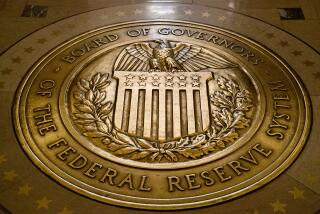Janet Yellen, a good fit at the Fed
- Share via
Congress has spent much of the last three years stumbling about like a traveler who’s lost his map, with no coherent strategy for bolstering the weak economy or putting more jobless Americans back to work. Meanwhile, the Federal Reserve has worked indefatigably, creatively and bravely to keep borrowing costs low, which has helped the housing industry regain its footing and encouraged U.S. businesses to expand. President Obama sought to keep the Fed on track Wednesday, nominating the reserve board’s No. 2, Janet L. Yellen, to be its new chair. It was a historic choice — Yellen would be the first woman to lead the Fed in its 100-year history. She also would provide much-needed continuity at the Fed, retaining its sense of mission and activist bent even as it starts withdrawing the fuel it has been pumping into the economy.
Yellen, a former UC Berkeley economics professor and San Francisco Federal Reserve Bank president, has a particular expertise in unemployment and labor markets. That’s helpful for a Fed chair, given that the central bank’s monetary policy is required by law to serve two ends: keeping prices stable and promoting full employment. She also brings credibility to the job of combating inflation, having been a strong advocate of the Fed’s move to explicit targets for inflation. Those targets help manage the public expectations that can drive price and wage growth.
Not that there was much of a gap, if any, between Yellen’s views on monetary policy and those of her chief rival for the nomination, former top White House economist Larry Summers, who withdrew from consideration last month. The most important difference between the two is that the more collegial Yellen is better prepared to succeed Fed Chairman Ben Bernanke, whose consensus-building skills helped keep most of the Fed’s key players united behind its aggressive and unconventional efforts to spur the economy. She also is expected to be tougher than Bernanke on the big Wall Street banks that the Fed regulates, and that’s a good thing.
The crucial question for the Fed now is when to stop its extraordinary efforts to hold down longer-term interest rates. Critics, including some affiliated with the central bank itself, argue that it’s past time for the Fed to stop buying bonds and adding to the $3.7 trillion pile of assets that it will eventually have to scale back severely. Continuing the easy money path for too long could fuel inflation or asset bubbles such as the one in housing that led to the last recession — a problem that Yellen warned about in 2005, although she didn’t foresee how badly things would end. But reversing course too soon or swiftly has risks too, including higher interest rates, tight credit and a global economic slowdown.
The Fed is expected to slow its bond-buying program before Bernanke leaves office in January, marking the first step in what will surely be a long and contentious process. And with Democrats and Republicans bitterly divided over how to manage the economy, it’s critical that the Fed remain focused on promoting growth while keeping a lid on inflation. That’s why the Senate should confirm Yellen.
More to Read
Inside the business of entertainment
The Wide Shot brings you news, analysis and insights on everything from streaming wars to production — and what it all means for the future.
You may occasionally receive promotional content from the Los Angeles Times.










